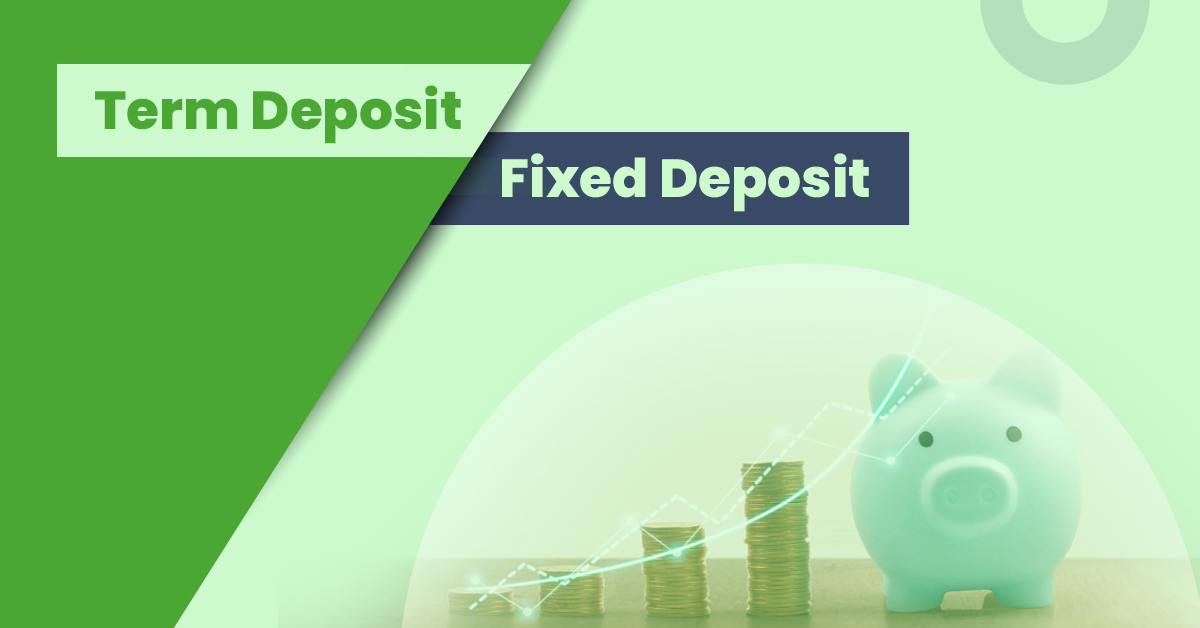Term Deposit vs Fixed Deposit


When building your investment portfolio, a fixed deposit is a natural choice. Moreover, FDs are considered safe and offer guaranteed returns. Most importantly, you have the flexibility to choose the amount you invest and the tenure of investment based on your preferred investment horizon. With an interest rate better than a savings account, the income generated on your FD deposit can be availed as monthly payouts, making it a passive income source.
However, have you ever felt confused when a bank or post office representative used the words ‘term deposit’ in the context of FDs? Does it make you wonder what exactly the difference between the two is? Using term deposit while describing fixed deposit has confused many investors, not just you.
In this blog, we will compare a term deposit Vs a fixed deposit to unearth the difference between the two.
Also Read: Experience financial growth with unmatched Bajaj Finance FD Rates
Difference Between a Term Deposit and a Fixed Deposit?
Firstly, there can be no comparison between term and fixed deposits as the two are the same. However, the names are often used interchangeably by different individuals and entities. For instance, banks typically refer to an FD as a term deposit, while consumers use the term fixed deposit. Moreover, in countries like Canada, New Zealand, and Australia, Term Deposit is a popular term for investment instruments like FDs; in India, on the other hand, the use of the word fixed deposit is more prevalent.
FDs, aka term deposits, come with the following features:
- FDs are offered by banks and Non-Banking Financial companies (NBFCs).
- FDs require you to put a lump sum money for a fixed tenure of typically seven days to 10 years.
- The interest rate for FDs varies from one bank to another and is based on your investment tenure. Typically, interest earned is higher than a savings account.
- The return on investment is compounded periodically (monthly, quarterly, half-yearly, or annually).
- The rate of interest offered to senior citizens is higher.
- To save taxes on your FD deposits, you can sign up for tax-saver FDs, which come with a lock-in period of 5 years. After subscribing to this plan, your investments will be tax-deductible under Section 80C of the Income Tax Act, 1961.
- You can re-invest for another term on maturity.
- You can avail of loans or credit cards against your FD corpus.
- While you are allowed to withdraw prematurely, a penalty will be levied.
Also Read: Fixed Deposit vs Liquid Funds – Which Instrument is Best for Your Portfolio?
Post Office Time Deposit vs Fixed Deposit Comparison Table
| Parameters | Post Office Time Deposit | Fixed Deposit |
Interest Rates for Senior Citizens | No higher rate for seniors. | Senior citizens are eligible for a slightly higher interest. |
| Interest Payout Intervals | Annual payouts. | Annual, monthly, quarterly or half-yearly payouts, as opted for by the account holder. |
| Tenure | 1, 2, 3 and 5 years. | Anywhere between seven days and ten years. |
| Auto-renewal Facility | Only offered by post office branches that have core banking solutions. | Provided for all fixed deposit accounts. |
Loan Against Deposits | You cannot take a loan against a post office time deposit. | Some banks and NBFCs extend a loan facility. |
Premature Withdrawals | After six months, depositors can make premature withdrawals and No penalty is levied. | While it differs across institutions, some provide early withdrawal without an extra charge, while others have a penalty. |
| TDS Applicability | No. | Yes, if the interest amount crosses Rs.10,000. |
Also Read: FD vs RD: Differences Between Fixed Deposits and Recurring Deposits
Which Product Should I Choose?
There are multiple parameters to consider before choosing a fixed or term deposit. Your decision must be based on your financial needs, goals and cash flow needs. Consider the following factors when selecting a term or fixed deposit:
- Minimum Deposit Requirement
The minimum amount to open a fixed deposit varies between Rs.1000 to 5000. So, consider your finances before investing in an FD. - Cumulative or Non-Cumulative FDs
There are two types of FDs – cumulative and non-cumulative. The cumulative FD, also known as Special Term Deposit, means that the interest is not paid at a regular frequency. Instead, it is reinvested, and you receive the entire interest income on maturity. On the other hand, a non-cumulative option means that you have chosen to receive interest payouts monthly, quarterly, half-yearly or annually, as per your needs. - Maturity time-frame
You can open a fixed deposit with a minimum and maximum tenure between seven days and ten years, respectively. Typically, a longer term also comes with higher interest. For instance, the post office time deposit offers a 6.9% interest rate for one, 7% for two and three years, and 7.5% for five years. Choose based on your ability to commit to a specific time frame. - Premature withdrawal
Banks and NBFCs vary when it comes to early withdrawal policies. Some banks charge a penalty on the interest, while others will merely reduce the interest amount. It is best to understand the terms and conditions in detail. - Collateral for loan
Your fixed deposit can be used as collateral for securing a loan. Banks typically allow a loan between 85 and 95% of the fixed deposit corpus. Understand the applicable interest rates and the principal amount you are eligible to use as collateral before applying for a loan. - Taxation
A tax-saver FD will be ideal if you want a tax benefit. Deposits of up to Rs.1.5 lakhs made to this scheme are tax-deductible under Section 80C of the Income Tax Act, 1961. However, the lock-in period for this FD plan is five years.
Final Thoughts
When funds sit idle in your savings account, you are tempted to withdraw them and spend. Hence, a fixed deposit is an effective way to inculcate a saving habit and earn guaranteed returns. Moreover, the funds earn interest, which continues to compound for the tenure of the deposit. To ensure that your FD continues to generate an income, renew it on maturity.
Hope this article has been able to decode the terms fixed and term deposits so that next time you visit a bank or post office, you don’t spend time comparing term deposit vs fixed deposit. Since both are the same instruments, if required, explore other investment schemes and weigh them against a fixed deposit to decide which one suits your spending appetite and fund requirements.
FAQs
Which is better – term deposit vs recurring deposit?
While FD requires you to deposit a lump sum for a fixed period, RD is about depositing fixed amounts in small intervals over a long period. FD is a traditional and natural choice if you are a serious investor. However, if you want to cultivate a savings habit, then RD would be more beneficial.
Which investment instruments offer higher returns than a term deposit?
For higher returns, you can look at investing in the stock markets, mutual funds and high-yield bonds with a time horizon of three to five years. However, all the instruments listed above are market-linked and come with a degree of risk. On the other hand, a term deposit is risk-free and offers fixed returns.
What’s the risk associated with investing in a term deposit?
Term deposits are risk-free; they are highly secure instruments that offer assured returns. Term deposits are not dependent on market performance and are not affected by market volatility.
Do you pay tax on term deposits?
Yes. The interest earned on term deposits is subject to tax. The interest income is categorised under ‘income from other sources’ and taxed according to one’s income tax bracket. However, if the interest earned is less than INR 10,000, it is not taxable under the 80TTA of the Income Tax Act.
What happens when a fixed deposit matures?
On maturity, you receive the principal amount back in your savings account. However, if you have chosen a cumulative option, you will also receive interest. You can also opt for an automatic renewal upon maturity when opening the fixed deposit. Under this arrangement, your account will be auto-renewed for the same tenure. Hence, your principal gets re-invested and is not credited back.




